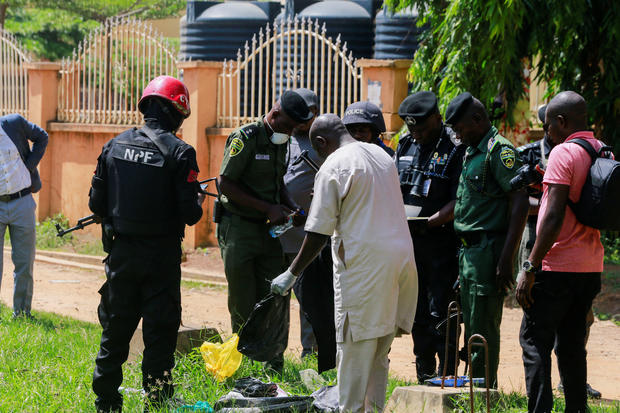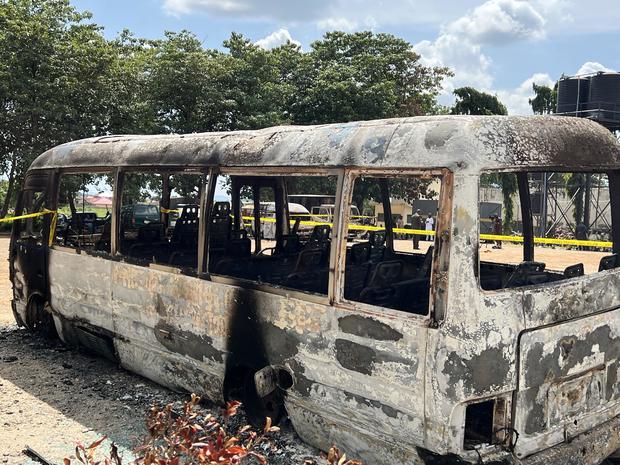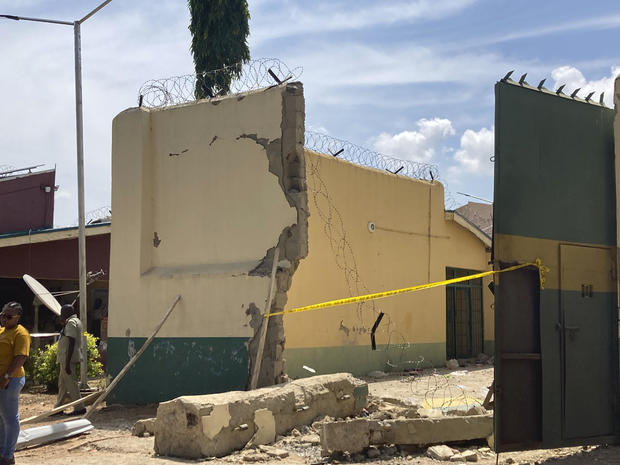Nearly 900 inmates escaped in a prison break in Nigeria’s capital Abuja, officials said Wednesday, blaming the attack. Islamic extremist rebels.
At least 443 of the 879 escapees are still missing, said Umar Abubakar, a spokesman for the Nigerian Correctional Service, while hundreds of others have been recaptured or handed over to police stations.
Officials “will track all the escaping prisoners and bring them back into custody,” Abubakar said.
Later on Wednesday, Nigerian President Muhammadu Buhari visited the prison where senior officials showed him the facilities. He then tweeted that he was “saddened” by the attack and “disappointed” with Nigeria’s intelligence system.
“How can terrorists be organized, have weapons, attack a security facility and get away with it?” Buhari asked.
“Very determined” rebels attacked Kuje Maximum Prison in Abuja on Tuesday night with “very high-grade explosives” and killed a guard on duty, according to Shuaib Belgore, permanent secretary of Nigeria’s Ministry of Interior.
SOTUNDE ASTRONOMY/REUTERS
Explosions and gunfire were heard around 10pm in the Kuje area when the attackers arrived and forced their way into the prison through a hole created by the explosions.
The Islamic extremist rebels who attacked the prison have he made an insurrection in the northeast of the country for more than a decade. Their attack on the detention center freed many of its members who are inmates, prison officials said.
“We understand that they are Boko Haram. They came specifically for their co-conspirators,” Belgore said.
Kuje’s maximum security prison held nearly 1,000 inmates, including 64 suspected Boko Haram extremists, all of whom have escaped, said Major General Bashir Salihi Magashi, Nigeria’s defense minister.
Adam Abu-bashal/Anadolu Agency via Getty Images
He told reporters that security officials on the ground did “what they could” to prevent the prison break. “We’re trying to see what we can do to ensure that all runaways are returned,” he said.
As of Wednesday morning, bullet shells were strewn across the prison premises as helicopters hovered over the Kuje area as security operatives combed nearby bushes for escapees. Several vehicles were destroyed during the night’s shooting.
Some recaptured prisoners were lying on the ground at the entrance to the prison near the bodies of those who died in the attack.
The Abuja prison break came as gunmen launched a daring attack on an advance security convoy preparing for Nigerian President Muhammadu Buhari’s visit to the northern state of Katsina. west Those attackers “opened fire on the convoy from ambush positions, but were repelled by the military,” a presidential spokesman said.
Nigeria’s jihadist rebels and other armed groups have carried out several jailbreaks in the country’s northeast in recent years, but this is the first in the capital in recent years.
In 2021, more than 2,500 inmates were released in three prison breaks. At least 4,307 inmates have escaped from Nigerian prisons since 2017, Lagos-based online newspaper TheCable reported this month, based on compiled media reports.
According to security analysts, most of the recent jailbreaks in Nigeria appear to be disconnected, although the attacks are carried out in a similar manner using explosives. A good number of those who have fled in these attacks were awaiting trial. Nigerian prisons hold 70,000 inmates, but only about 20,000, or 27 percent, have been convicted, according to government data.
Chinedu Asadu/AP
Nigeria’s extremist insurgency, waged by Boko Haram and an offshoot known as the Islamic State’s West Africa Province, is blamed for the violence that has killed more than 35,000 people and displaced more than 2 million people, according to the UN Prolonged instability, hunger and lack of health services caused by the insurgency have indirectly led to the death of more than 300,000 additional people, according to the UN.
Extremist violence is the most serious security challenge in Nigeria, Africa’s most populous country of 206 million, which is also battling violence in the northwest by rebel herdsmen and a separatist movement in the south of the country
Prisons in Africa’s most populous country are often overcrowded. Up to 70% of prisoners are in pre-trial detention and can be kept awaiting trial for years. An even bigger jailbreak it was carried out in the south-eastern state of Imo in April last year. It was unclear which group orchestrated the escape, but the region has long been a hotbed for Nigerian separatist groups, and tensions between federal authorities and the indigenous Igbo population are often high.
Month
[ad_2]
Source link








